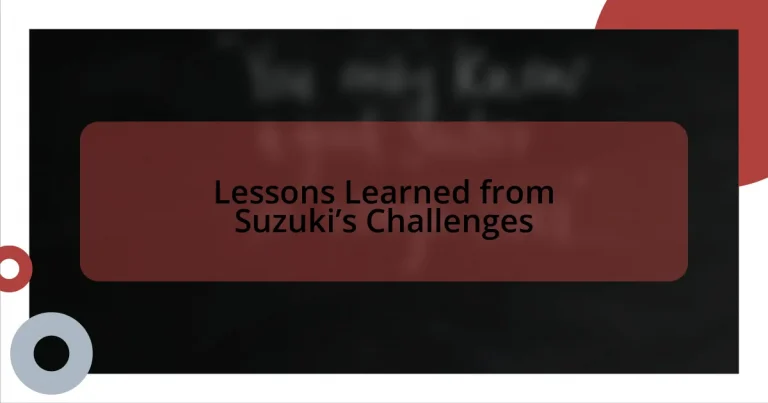Key takeaways:
- Suzuki’s struggles stem from its hesitation to innovate and adapt to technological advancements, particularly in electric vehicles.
- External factors like economic fluctuations and varying global market dynamics have compounded Suzuki’s challenges, impacting brand perception and customer trust.
- Adaptive leadership, effective communication, and transparency are crucial for Suzuki to rebuild trust and foster a resilient corporate culture.
- Future success for Suzuki hinges on embracing sustainability, enhancing global collaboration, and fostering innovation across its operations.

Understanding Suzuki’s Challenges
Suzuki has faced a myriad of challenges over the years, many stemming from fierce competition in the automotive sector. I remember discussing with a friend how shocking it was to see such a once-revered brand struggling to keep pace with industry giants. What must it feel like for the employees and loyal customers to watch their beloved brand falter?
One of the most significant obstacles Suzuki encountered was adapting to the rapid technological advancements in vehicle production and design. When I think about how other companies pivoted swiftly to electric vehicles, it makes me wonder—could Suzuki have leveraged its long-standing reputation for compact cars to make a timely entry into this new market? The hesitation to innovate might have cost them in the race toward sustainability.
Moreover, Suzuki’s challenges were compounded by its need to maintain quality while simultaneously expanding globally. I vividly recall a conversation with a car enthusiast who pointed out the inconsistencies in quality among Suzuki’s international offerings. How frustrating would that be for a brand that prides itself on reliability? It highlights the tightrope that Suzuki needs to walk between growth and maintaining the trust of its customers.
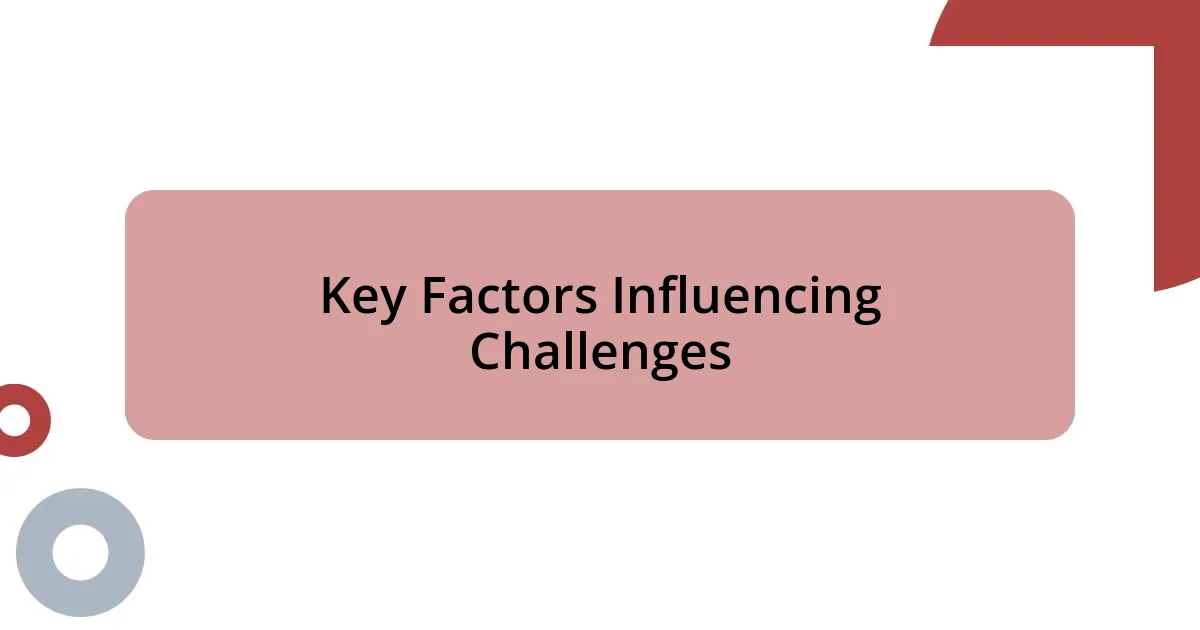
Key Factors Influencing Challenges
When I reflect on Suzuki’s struggles, I notice that external factors played a significant role in influencing their challenges. Economic fluctuations, shifts in consumer preferences, and intense competition shaped the landscape they navigated. I once chatted with a friend who shared their frustration about how swiftly brands adapt to market changes, and it made me realize that being reactive rather than proactive can lead to missed opportunities.
Key factors influencing challenges include:
- Technological Advancements: Competitors like Tesla stepped ahead in electric vehicles, putting pressure on Suzuki to innovate rapidly.
- Global Market Dynamics: Different markets demand varied approaches, and Suzuki’s one-size-fits-all strategy may have limited its effectiveness.
- Brand Perception: The mixed international quality could harm the brand’s longstanding reputation, affecting sales and customer loyalty.
In another conversation at an automotive event, I remember hearing industry experts discuss how crucial it is for brands to align their manufacturing processes with modern expectations. This resonates deeply when I think about Suzuki’s missed chances in a fast-evolving automotive field. Being outpaced by nimble competitors showcases a vital lesson: sometimes, it’s not about having the best product but rather about being in tune with what the market truly desires.
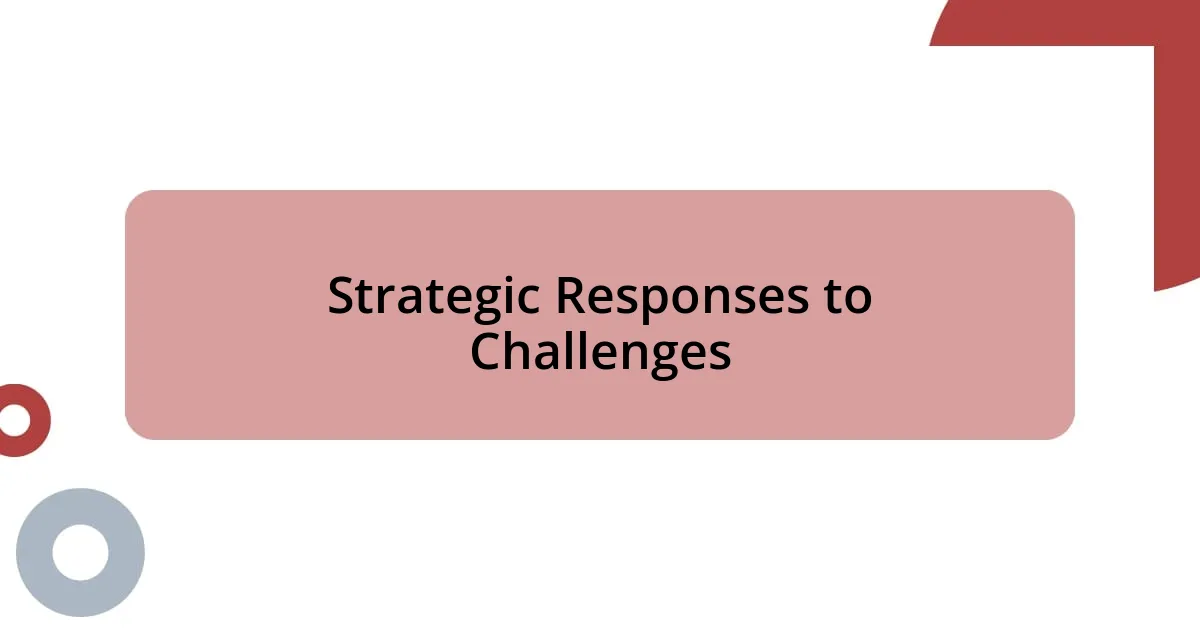
Strategic Responses to Challenges
Strategic Responses to challenges often determine a company’s survival and growth trajectory. I’ve seen firsthand how companies can thrive by making bold decisions in tough times. For instance, Suzuki might consider partnerships with tech companies to co-develop electric vehicles, thereby tapping into the expertise of those already excelling in this area. This collaboration could reinvigorate their product line and attract a new customer base eager for innovation.
It’s fascinating to observe how flexibility plays a crucial role in responding to market challenges. Reflecting on my own experiences, I once had a friend who pivoted from traditional retail to online sales, responding to the shifting consumer landscape. Similarly, Suzuki could benefit from adopting a more localized approach in their global strategy, tailoring products to meet the specific needs of different markets. I can’t help but wonder how this could enhance their brand appeal and customer loyalty over time.
Moreover, responding to challenges with transparency can foster trust. I was once involved in a project where clear communication greatly improved teamwork. Suzuki could benefit from openly addressing its challenges and engaging with customers and stakeholders about its plans. This openness not only cultivates a sense of community among enthusiasts but can also win back the trust of those disheartened by quality inconsistencies. In my experience, such straightforwardness often paves the way for lasting relationships.
| Strategic Response | Description |
|---|---|
| Partnerships | Collaborating with tech firms to enhance vehicle innovation, especially in electric vehicles. |
| Localized Strategies | Tailoring products to specific regional markets to better meet customer needs. |
| Transparency | Engaging openly with customers about challenges and strategies to regain trust. |
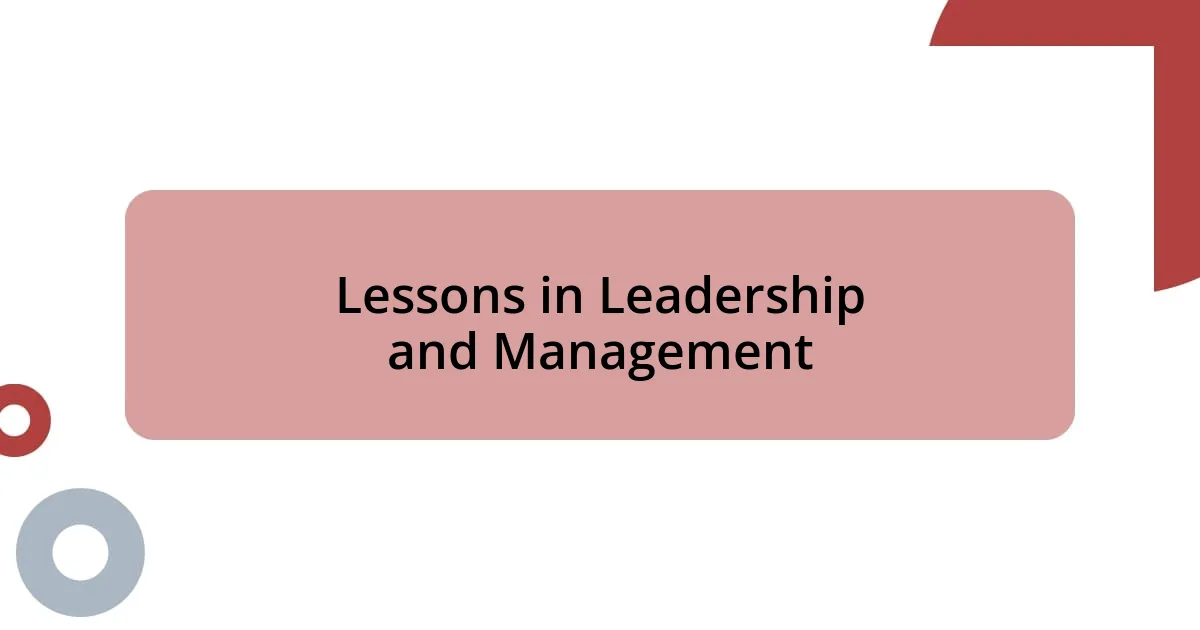
Lessons in Leadership and Management
Reflecting on Suzuki’s journey, I can’t help but appreciate the significance of adaptive leadership. During my time in a project management role, I witnessed how leaders who embraced change rather than resisted it fostered a culture of innovation. In Suzuki’s case, recognizing the need for flexibility in leadership could mean the difference between stagnation and thriving in today’s fast-paced market. How can we expect teams to excel if their leaders cling to outdated processes?
Moreover, effective communication within teams is paramount. I remember a time when a lack of clear messaging led to confusion and frustration among my colleagues during a product launch. For Suzuki, prioritizing open lines of dialogue within the organization could streamline operations and enhance morale, especially when navigating tough times. Isn’t it interesting how just one conversation can spark inspiration and reinvigorate a team’s drive?
Lastly, I believe that visionary leadership goes beyond just setting goals; it involves cultivating a shared purpose. In my experience volunteering for various initiatives, I found that when everyone felt connected to a common mission, enthusiasm skyrocketed. If Suzuki can instill a sense of purpose throughout its workforce, they could harness collective passion, ultimately enabling the brand to rebound from its challenges. Wouldn’t a united team pave the way for remarkable growth?
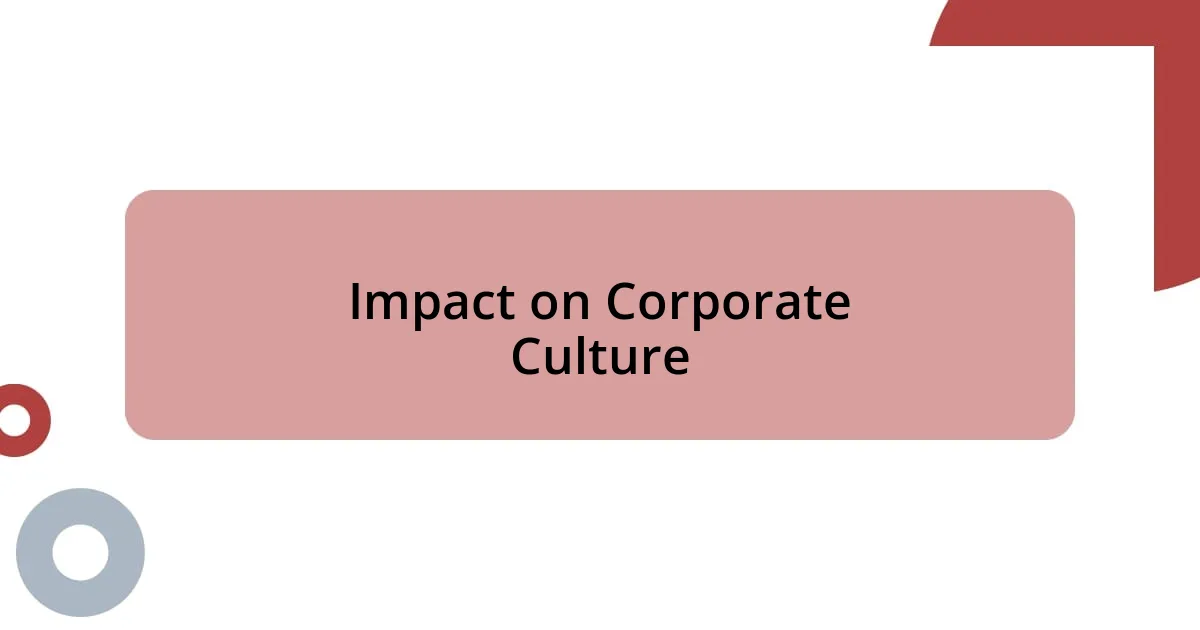
Impact on Corporate Culture
Navigating through challenges can significantly reshape a company’s corporate culture. From my own experience, I’ve seen how adversity can either fracture a team or unite them. During a particularly tough project, our team rallied together, driven by a shared commitment to overcome obstacles. This collective resolve created an environment where collaboration flourished, and I imagine that Suzuki could harness similar solidarity to foster resilience amidst its challenges.
Emphasizing values such as accountability and integrity is essential when a company is in crisis. I recall a situation where a clear commitment to ethical practices transformed my workplace atmosphere. When teams feel responsible for their contributions, it cultivates a culture of trust. If Suzuki reinforces these values internally, it not only strengthens its corporate fabric but also extends that trust to customers who desire a reliable brand.
Let’s not overlook the power of employee engagement in shaping culture. I once participated in a company-wide initiative where employees were invited to share their thoughts on product innovations. The excitement and fresh ideas generated during those discussions were palpable. By involving its workforce in decision-making, Suzuki could foster a sense of ownership that invigorates its culture. How can we expect employees to be motivated if they feel disconnected from the company’s vision?
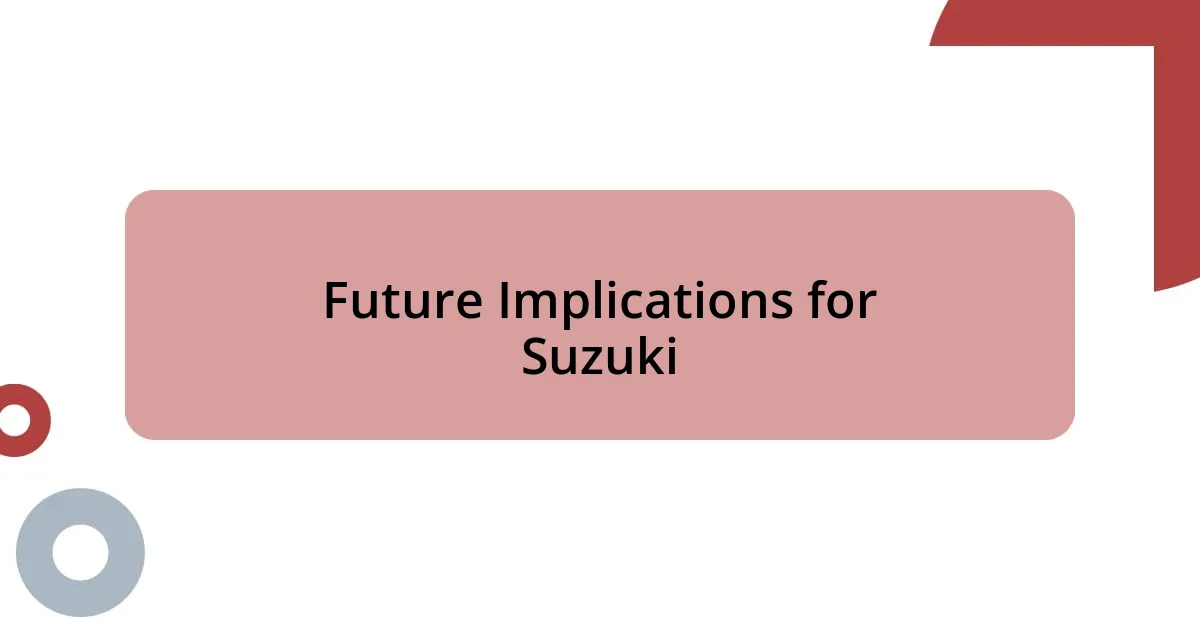
Future Implications for Suzuki
Looking ahead, Suzuki’s ability to adapt to changing market dynamics will be crucial. During my previous work with a start-up, we faced intense competition that forced us to innovate quickly, leading to some of my most rewarding moments. If Suzuki can channel that same urgency and creativity, it can reestablish itself as a leading player rather than just a participant in the automotive arena.
Moreover, the strategic focus on sustainability may redefine Suzuki’s brand identity. I once had the opportunity to witness how a commitment to eco-friendly practices could transform a company’s public image. By prioritizing green technologies and sustainable manufacturing, Suzuki could not only appeal to environmentally-conscious consumers but also elevate its market standing. Isn’t it fascinating how a shift towards sustainability can become a beacon of hope in a crowded marketplace?
Finally, enhancing global collaboration will serve as a linchpin for Suzuki’s future success. I recall collaborating on a cross-border initiative where diverse perspectives led to groundbreaking solutions. By fostering deeper partnerships with international teams, Suzuki can tap into a wealth of insights and innovations, thus strengthening its global footprint. Could this interconnectedness be the secret ingredient for Suzuki to thrive in a rapidly evolving industry?
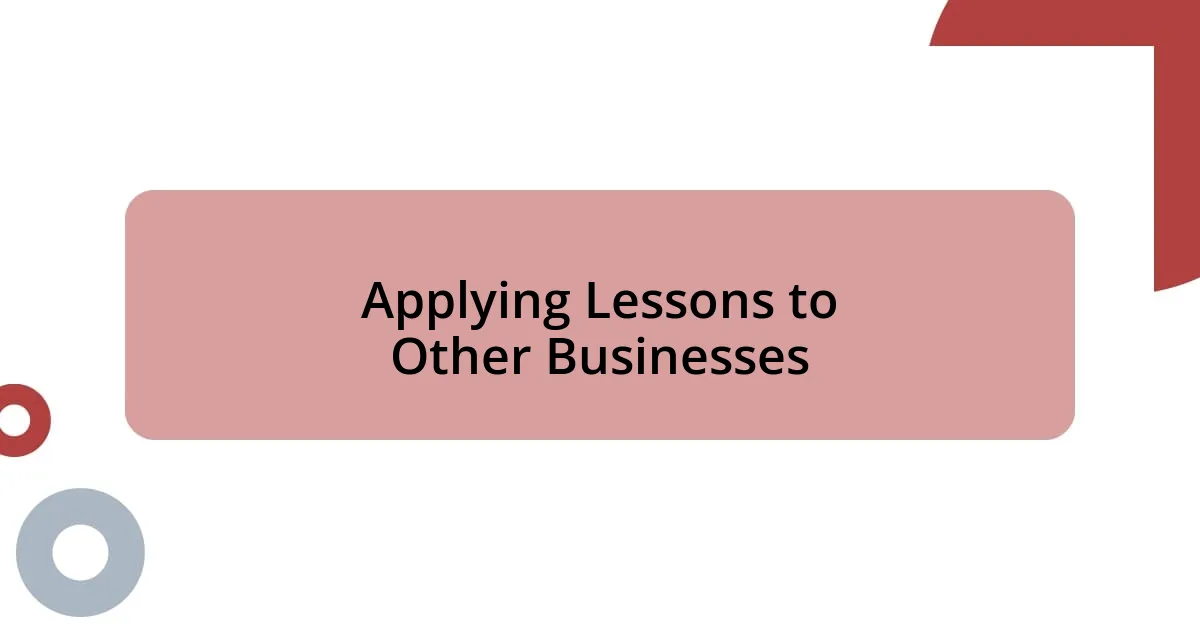
Applying Lessons to Other Businesses
Applying the lessons learned from Suzuki’s challenges to other businesses can be incredibly insightful. For instance, during my tenure at a mid-sized firm, we faced backlash after a product launch went awry. My team learned the hard way that transparency is crucial; owning our mistakes not only salvaged our reputation but also deepened customer loyalty. Isn’t it interesting how admitting fault can sometimes lead to stronger connections with clients?
Additionally, I believe fostering innovation can be a game changer. In a previous role, we realized that encouraging team members to brainstorm without limits generated some of our best ideas. This collaboration eroded the fear of failure, creating a culture where experimentation was celebrated. Companies, much like Suzuki, can benefit immensely by creating safe spaces for employees to share creative solutions, ultimately driving business growth.
Finally, I can’t stress enough the importance of agility. I remember a time when our business model needed a drastic overhaul to keep pace with industry trends. By quickly pivoting our strategy and adjusting our offerings, we not only survived but thrived. Businesses that can adapt swiftly, like Suzuki is called to do, can turn challenges into opportunities for lasting success. How ready is your organization to embrace change?












